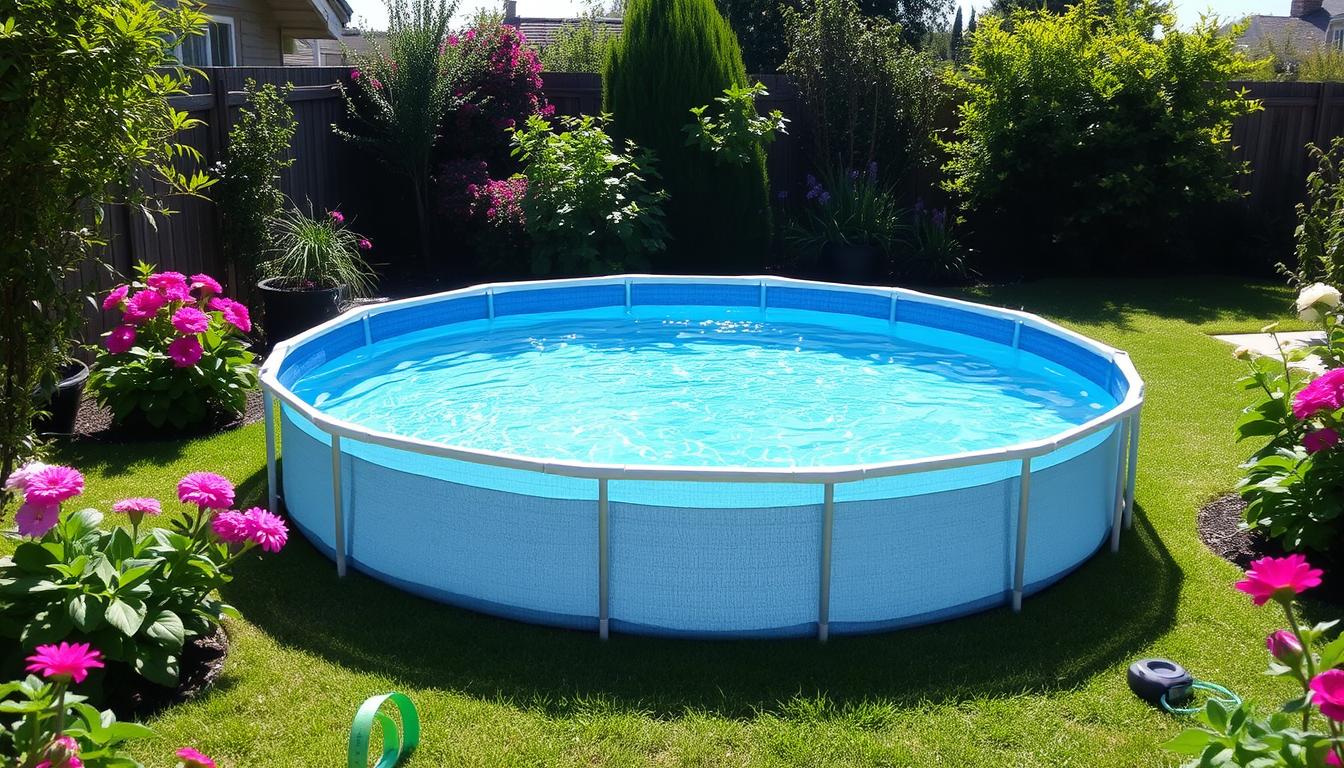
Curious about your 18-foot round pool’s water capacity? Knowing this is crucial for proper maintenance and cost management. It helps you keep the water clean and your filtration system running efficiently.
Understanding your pool’s volume is key to a great swimming experience. It affects chemical treatments, heating, and water conservation decisions.
Your pool’s volume depends on its depth, shape, and extra features. Stairs or seating areas can change the total gallons. Accurate calculations help you make smart choices for your pool care.
Key Takeaways
- An 18 foot round pool typically holds around 7,000 gallons of water
- Knowing your pool’s gallon capacity is crucial for maintaining water quality and managing costs
- Factors like depth, shape, and additional features affect your pool’s volume
- Accurately calculating your pool’s volume helps you make informed decisions about chemical treatments and filtration
- Understanding your pool’s gallon capacity is essential for ensuring a safe and enjoyable swimming experience
Understanding Pool Volume
Pool volume affects many aspects of pool care. It impacts chemical needs, heating costs, and filtration efficiency. Knowing your pool’s volume ensures a safe and clean swimming environment.
It also helps you create an enjoyable space for family and friends. Proper volume calculations lead to better pool maintenance overall.
The Importance of Knowing Your Pool’s Gallon Capacity
Accurate pool volume is key for proper chemical use. Too much or too little can cause problems like skin irritation or cloudy water.
It can even damage pool surfaces and equipment. Knowing your pool’s volume also helps optimize energy use for heating.
The amount of water affects how long it takes to reach a comfortable temperature. This knowledge can lead to significant energy savings.
Factors Affecting Pool Volume
Pool size and shape are the main factors in determining volume. Larger pools hold more water than smaller ones. The pool’s shape also affects volume calculations.
Round and oval pools need different methods than rectangular ones. Water depth is another crucial factor. Pools with varying depths have different volumes than those with consistent depth.
| Pool Size | Gallon Capacity |
|---|---|
| 15′ x 52″ Round | 5,724 gallons |
| 18′ x 52″ Round | 8,242 gallons |
| 24′ x 52″ Round | 14,652 gallons |
| 15′ x 30′ x 54″ Oval | 15,147 gallons |
| 18′ x 33′ x 54″ Oval | 19,994 gallons |
Pool gallon capacity varies based on size and shape. An 18-foot round pool with 52″ walls holds about 8,242 gallons.
A 24-foot round pool with the same wall height holds around 14,652 gallons. Oval pools have different capacities than round ones.
For example, a 15′ x 30′ x 54″ oval pool holds about 15,147 gallons. These differences highlight the importance of accurate volume calculations.
Calculating Gallons in an 18 Foot Round Pool
Knowing your pool’s water volume is crucial. It helps with chemical balance and equipment selection. Let’s explore how to calculate gallons in an 18-foot round pool.
Formula for Determining Pool Volume
The formula for calculating pool volume is:
Volume (gallons) = π × R2 × D × 7.5
Where:
- π (Pi) is approximately 3.14159
- R is the radius of the pool (half of the diameter)
- D is the average depth of the pool
- 7.5 is the conversion factor from cubic feet to gallons
Step-by-Step Guide to Calculating Gallons in an 18 Foot Round Pool
Let’s walk through the steps to calculate gallons in an 18-foot round pool:
- Measure the pool’s diameter, which is 18 feet.
- Divide the diameter by 2 to get the radius. The radius is 9 feet.
- Determine the average depth by measuring shallow and deep ends. Add them and divide by 2.
- Apply the formula: Volume (gallons) = 3.14159 × 92 × 4 × 7.5
- Calculate the result: Volume (gallons) = 3.14159 × 81 × 4 × 7.5 = 7,646 gallons
How Many Gallons in an 18 Foot Round Pool?
An 18-foot round pool with a 4-foot average depth holds about 7,646 gallons. Actual capacity may vary based on specific dimensions.
| Pool Size | Wall Height | Gallon Capacity (Approx.) |
|---|---|---|
| 18′ Round | 52″ | 8,242 |
| 18′ Round | 54″ | 8,565 |
Use the chart and formula to estimate your pool’s gallon capacity. This info helps maintain water chemistry and plan for usage costs.
Conclusion
Installing an above ground pool needs careful planning. Follow building codes to avoid costly mistakes. Keep pools 10-15 feet from property lines and barriers 52 inches high. Electrical services for pool pumps can cost $500 to $2,000.
Choose a durable above ground pool for long-term value. High-quality pools with metal rolled walls or panel construction last longer. Brands like Buster Crabbe and Aquasport 52 offer thicker liners and aluminum walls.
Create your backyard oasis with proper pool maintenance. Pay attention to water volume and gallon capacity. Work with experienced professionals to select the right pool model.
By following these guidelines, you’ll enjoy your above ground pool for years. Maintain a safe and inviting environment for endless summer fun.







